 A typical gaming scene in the mid 2000's. People hang out while two gamers play a Nintendo Wii with motion controls.
A typical gaming scene in the mid 2000's. People hang out while two gamers play a Nintendo Wii with motion controls.
Trends
Internet Gaming matures
In late 1999 EverQuest was released, popularizing MMORPGs.[1] The 2000's saw the release of popular MMORPG's such as World of Warcraft, and Runescape.[2] These MMORPGs offered unique social experiences for their players and resulted in in game social institutions being formed.[2]
New Economics of games

The concept of free to play games primarily downloaded on the internet with small paid additions, microtransactions, is refined. This strategy begins to be seriously pursued by major game companies like EA by the end of the decade.[3]
Companies begin seriously marketing small DLC, with incidents like Horse Armor DLC for Oblivion initially attracting an incredulous response for selling something that did not include story or other additional content,[4] and becoming a common joke online by the end of the decade.[5][6]
Virtual in game currencies that can be officially exchanged for real currencies or to replace membership costs emerge in games like Second Life and EVE Online.[7][8] In part due to concerns of inflation, EVE Online developer CCP Games hires an economist to manage the in game economy.[9] In games that prohibit trading in game currency for real currency like World of Warcraft, and to a lesser extent games that allow it like EVE Online, under the table deals and grey markets for in game currency obtained by techniques like gold farming arise.[8][10] In game thefts for real world gain begin catching the public eye.[11]
Games as Apps, Mobile gaming in the 2000's
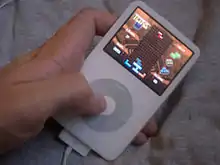
Games for non-gaming mobile computer devices gained popularity, often running on mobile media players like iPods, or on basic feature phones.[12]
Later the introduction of smartphones and application stores on them made mobile gaming more accessible.[13]
Popular Genres

- First Person shooters
- Role Playing games
- Massively multiplayer online role-playing games (MMORPG)
- Rhythm and Music games.
Cross Platform Games of the 2000's
- Oni - PS2, Windows, Mac OS - 2001
- Viewtiful Joe 2 - GameCube & PS2 - 2004
- Shrek SuperSlam - 2005
- Sonic the Hedgehog - 2006
- Grand Theft Auto IV - 2008
- Bayonetta - 2009
- The Beatles: Rock Band - 2009
2001
War on Terror
The horrific attacks on September 11th, 2001 had huge repercussions on both culture and the global economy.[14][15] In response to the attacks, many games are delayed and edited out of respect to the victims of the tragedy.[16]
2002
Game Jams
In early 2002 Game Jams begin taking off with developers. In Oakland, California the 0th Indie Game Jam is held from March 15th, to March 18th.[17] The first Ludum Dare follows shortly in April.[18]
2003
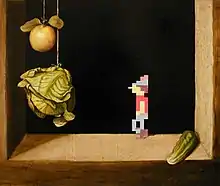
Strategy Guides
By 2003 the rush to write official strategy guides that release either on or before the launch of a game lead to poor quality writing in such guides.[19] Furthermore some strategy guides for Square Enix games required use of a non-free website in conjunction with the guide[20], which was problematic in an era before laptops and mobile devices were common, and when desktop computers were often kept in separate rooms from a television and console. Meanwhile a popular unofficial strategy guide website GameFAQs is acquired by CNET.[21]
2005
Corrupted Blood
In 2005 a bug in the popular MMORPG World of Warcraft leads to the player transmissible status effect Corrupted Blood not always disappearing after a specific encounter, thus spreading across the game world and infecting over a million player characters in a virtual epidemic.[22]
The event became a subject of academic research by medical professionals, as the event was essentially a model of a real life epidemic.[23] In particular observations from the Corrupted Blood incident would later be used in 2020 by researchers looking to understand decision making during the COVID-19 pandemic.[24]
2005 Gallery
 A typical game shop in 2005, showing a variety of games for sale.
A typical game shop in 2005, showing a variety of games for sale..jpg.webp) Japanese arcade in 2005, featuring Purikura booths.
Japanese arcade in 2005, featuring Purikura booths.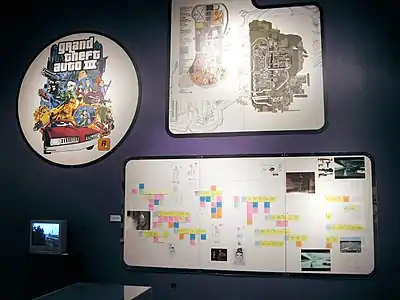 Planning for Grand Theft Auto III on display in 2005.
Planning for Grand Theft Auto III on display in 2005. PSP Demo Bubbles at E3 2005.
PSP Demo Bubbles at E3 2005.
2007
Great Recession
The Great Recession hits the economy in 2007, wiping out savings and deeply hurting the stock market.[25] Sales of video games and gaming hardware subsequently drop.[26] Compared to other industries, the gaming industry was relatively resilient.[27]
2008
Tabula Rasa in Space
The creator of Ultima, Richard Garriott, flies to the International Space Station as a tourist.[28] He attempts to play the game Tabula Rasa into space, but this is denied for security reasons, bringing the code of Tabula Rasa with him and broadcasting a message to players instead.[29][30][31]
2008 Gallery
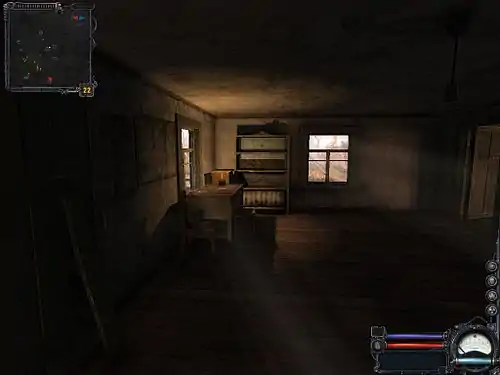 S.T.A.L.K.E.R.: Clear Sky, a game released in 2008.
S.T.A.L.K.E.R.: Clear Sky, a game released in 2008. Richard Garriot (Right) on the International Space Station with Greg Chamitoff, Michael Fincke, and experimental satellites free floating.
Richard Garriot (Right) on the International Space Station with Greg Chamitoff, Michael Fincke, and experimental satellites free floating._2.jpg.webp) The line for GTAIV on launch in Las Vegas, 2008.
The line for GTAIV on launch in Las Vegas, 2008..jpg.webp) Fallout 3 at PAX 2008
Fallout 3 at PAX 2008_mockup_on_Sony_Ericsson_phone.jpg.webp) Simple games gained popularity on mobile phones such as this Sony Ericsson running Edge in 2008.
Simple games gained popularity on mobile phones such as this Sony Ericsson running Edge in 2008. The original iPhone, next to an iPhone 3G compared in 2008, both popular smartphones of the late 2000's.
The original iPhone, next to an iPhone 3G compared in 2008, both popular smartphones of the late 2000's.
2000's Gallery
Screenshots
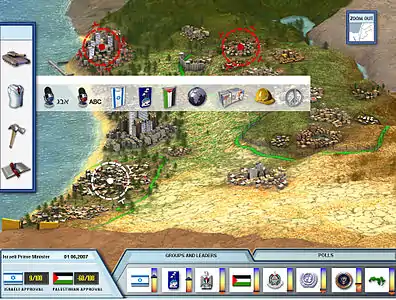 PeaceMaker, a strategy game from 2007.
PeaceMaker, a strategy game from 2007..jpg.webp) Symphony featuring music from Oblivion in 2007.
Symphony featuring music from Oblivion in 2007.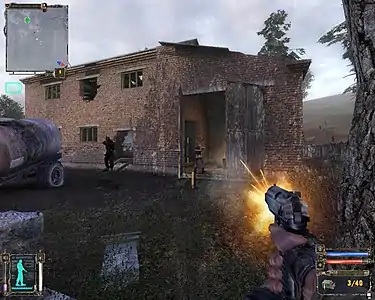 S.T.A.L.K.E.R.: Shadow of Chernobyl, a game from 2007.
S.T.A.L.K.E.R.: Shadow of Chernobyl, a game from 2007.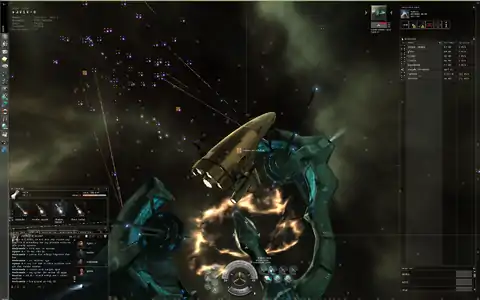 Combat in EVE online in 2007.
Combat in EVE online in 2007.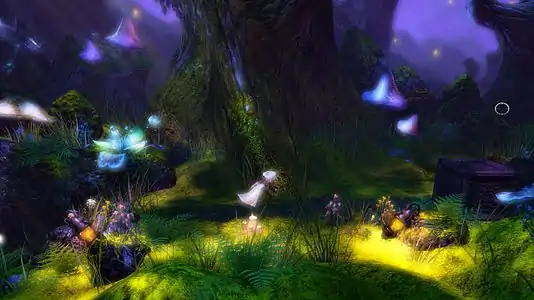 Trine, a game released in 2009.
Trine, a game released in 2009.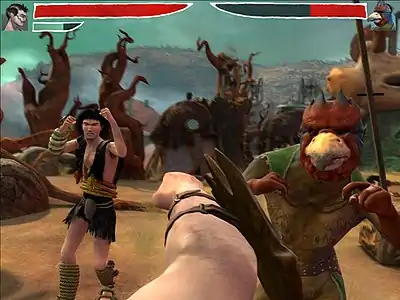 Zeno Clash in 2009.
Zeno Clash in 2009.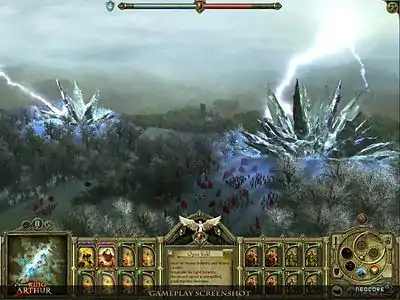 King Arthur: The Role-playing Wargame, a game released in 2009.
King Arthur: The Role-playing Wargame, a game released in 2009.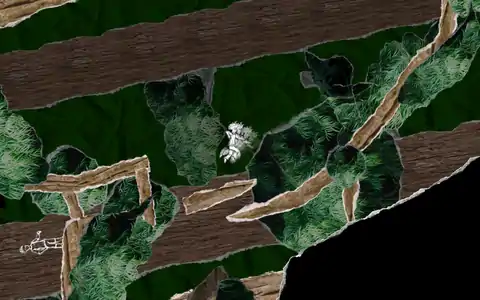 And Yet It Moves, a game released in 2009.
And Yet It Moves, a game released in 2009.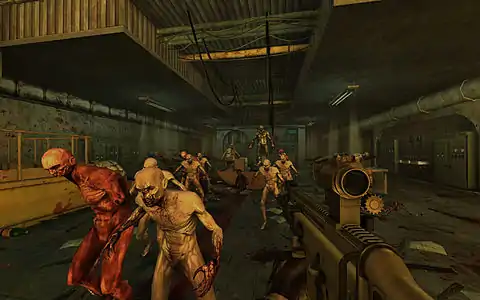 The 2009 release of Killing Floor.
The 2009 release of Killing Floor.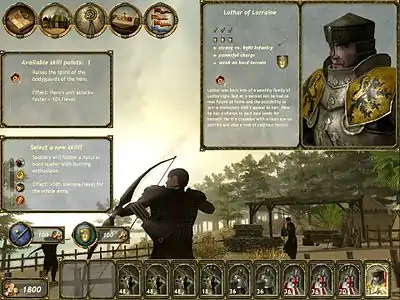 Crusaders, a 2009 video game.
Crusaders, a 2009 video game.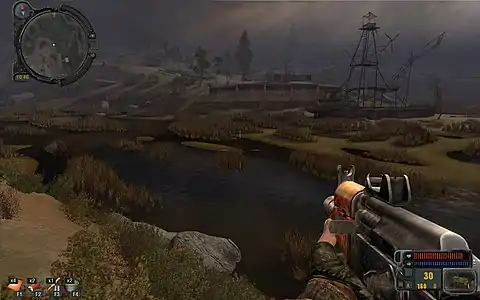 S.T.A.L.K.E.R.- Call of Pripyat in 2009.
S.T.A.L.K.E.R.- Call of Pripyat in 2009.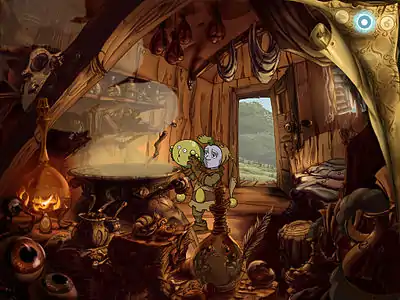 The Whispered World in 2009.
The Whispered World in 2009. Menu from the game Cricket Revolution, a fairly typical interface from 2009.
Menu from the game Cricket Revolution, a fairly typical interface from 2009.
Events
 Ion Storm employees at E3 2000.
Ion Storm employees at E3 2000. Ralph Baer of Magnavox Odyssey fame receives the National Medal of Technology from President George W Bush in 2006.
Ralph Baer of Magnavox Odyssey fame receives the National Medal of Technology from President George W Bush in 2006. Allan Alcorn and Ralph Baer with a Brown Box prototype at GDC 2008.
Allan Alcorn and Ralph Baer with a Brown Box prototype at GDC 2008. Paul McCarney and Ringo Starr introduce the Beatles RockBand at E3 2009.
Paul McCarney and Ringo Starr introduce the Beatles RockBand at E3 2009..jpg.webp) Bayonetta promotion at E3 2009
Bayonetta promotion at E3 2009.jpg.webp) Promotion of Metal Gear Solid Touch for iOS at E3 2009.
Promotion of Metal Gear Solid Touch for iOS at E3 2009.
References
- ↑ "Engineering Everquest" (in en). https://spectrum.ieee.org/consumer-electronics/gaming/engineering-everquest.
- 1 2 Silva, Matthew De. "What I learned from getting scammed by 12-year-olds" (in en). https://qz.com/1608914/how-runescape-mmorpgs-shaped-millennials-during-childhood/.
- ↑ Schiesel, Seth (21 January 2008). "The Video Game May Be Free, but to Be a Winner Can Cost Money (Published 2008)". https://www.nytimes.com/2008/01/21/technology/21game.html.
- ↑ "Download Oblivion's horse armor, for a price" (in en). https://www.engadget.com/2006-04-03-download-oblivions-horse-armor-for-a-price.html.
- ↑ "Oblivion Horse Armor On Sale For Twice The Price" (in en-us). https://kotaku.com/oblivion-horse-armor-on-sale-for-twice-the-price-5193675.
- ↑ "Industry must address horse armour 'joke'". 15 July 2009. https://www.mcvuk.com/business-news/industry-must-address-horse-armour-joke/.
- ↑ "Virtual Economics" (in en). https://www.technologyreview.com/2005/12/01/229988/virtual-economics/.
- 1 2 "EVE Online player loses USD 19,000 in shady virtual currency deal" (in en). https://www.engadget.com/2008-12-30-eve-online-player-loses-usd-19-000-in-shady-virtual-currency-dea.html.
- ↑ Hillis, Scott (16 August 2007). "Virtual world hires real economist" (in en). https://www.reuters.com/article/us-videogames-economist-life/virtual-world-hires-real-economist-idUSN0925619220070816.
- ↑ "China's 'Gold Farmers' Play a Grim Game" (in en). https://www.npr.org/templates/story/story.php?storyId=10165824.
- ↑ "Gamer robs virtual bank to get real-world cash CBC News". https://www.cbc.ca/news/technology/gamer-robs-virtual-bank-to-get-real-world-cash-1.799414.
- ↑ Hill, Jason (4 September 2008). "The rise and rise of casual gaming" (in en). https://www.smh.com.au/technology/the-rise-and-rise-of-casual-gaming-20080904-gdstl3.html.
- ↑ Wortham, Jenna (5 December 2009). "Apple’s Game Changer, Downloading Now (Published 2009)". https://www.nytimes.com/2009/12/06/technology/06apps.html.
- ↑ "Events of 9/11 Affected U.S. Culture in Ways Both Clear and Obscure". https://www.trincoll.edu/NewsEvents/NewsArticles/pages/911Panel.aspx.
- ↑ Brainard, Lael (NaN). "Globalization in the Aftermath: Target, Casualty, Callous Bystander?". https://www.brookings.edu/research/globalization-in-the-aftermath-target-casualty-callous-bystander/.
- ↑ "How 9/11 Affected Games bit-tech.net" (in en). https://bit-tech.net/reviews/gaming/pc/how-9-11-affected-games/1/.
- ↑ "Technology Inspires Creativity: Indie Game Jam Inverts Dogma 2001!" (in en). www.gamasutra.com. https://www.gamasutra.com/view/feature/2989/technology_inspires_creativity_.php.
- ↑ "Get Your Game On with Ludum Dare: Interview with Mike Kasprzak (Part..." (in en). https://software.intel.com/content/www/us/en/develop/blogs/get-your-game-on-with-ludum-dare-interview-with-mike-kasprzak-part-1.html.
- ↑ "Decline of Guides". 8 September 2003. https://web.archive.org/web/20030908223435/http://alanemrich.com/Writing_Archive_pages/decline.htm.
- ↑ "GameSpy.com - Article". 17 June 2006. https://web.archive.org/web/20060617055414/http://archive.gamespy.com/articles/june03/dumbestmoments/readers/.
- ↑ "GameFAQs Acquired by CNET - Slashdot" (in en). https://games.slashdot.org/story/03/06/04/1438227/gamefaqs-acquired-by-cnet.
- ↑ "Corrupted blood incident—a not-so-virtual epidemic in a virtual world : Networks Course blog for INFO 2040/CS 2850/Econ 2040/SOC 2090". https://blogs.cornell.edu/info2040/2016/11/28/corrupted-blood-incident-a-not-so-virtual-epidemic-in-a-virtual-world/.
- ↑ Oultram, Stuart (1 December 2013). "Virtual plagues and real-world pandemics: reflecting on the potential for online computer role-playing games to inform real world epidemic research". Medical Humanities 39 (2): 115–118. doi:10.1136/medhum-2012-010299. ISSN 1473-4265. https://pubmed.ncbi.nlm.nih.gov/23584861/. Retrieved 6 January 2021.
- ↑ Elker, Jhaan. "World of Warcraft experienced a pandemic in 2005. That experience may help coronavirus researchers.". Washington Post. https://www.washingtonpost.com/video-games/2020/04/09/world-warcraft-experienced-pandemic-2005-that-experience-may-help-coronavirus-researchers/.
- ↑ Merle, Renae. "A guide to the financial crisis — 10 years later". https://www.washingtonpost.com/business/economy/a-guide-to-the-financial-crisis--10-years-later/2018/09/10/114b76ba-af10-11e8-a20b-5f4f84429666_story.html.
- ↑ Richtel, Matt (11 June 2009). "Video Games Aren't Recession-Proof". https://bits.blogs.nytimes.com/2009/06/11/video-game-industry-dips-further-in-may/.
- ↑ Terdiman, Daniel. "Is the video game industry recession-proof?" (in en). https://www.cnet.com/news/is-the-video-game-industry-recession-proof/.
- ↑ "What Did Richard Garriott Do In Space?" (in en-us). https://kotaku.com/what-did-richard-garriott-do-in-space-5214165. Retrieved 21 November 2020.
- ↑ "Video Games in Space Nixed Over Fears of Space Station Hacking" (in en-us). https://kotaku.com/video-games-in-space-nixed-over-fears-of-space-station-5478092. Retrieved 21 November 2020.
- ↑ "Garriott: 'Operation Immortality' Good Substitute For Playing Tabula Rasa In Space" (in en). https://www.gamasutra.com/view/news/111612/Garriott_Operation_Immortality_Good_Substitute_For_Playing_Tabula_Rasa_In_Space.php. Retrieved 21 November 2020.
- ↑ "Garriott Sends Coded Message From Space" (in en-us). https://www.wired.com/2008/10/garriott-sends/. Retrieved 21 November 2020.